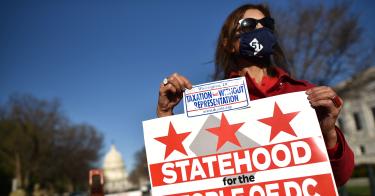Our nation’s capital was always meant to be unique. The founders wanted it to be a federal district, existing beyond the confines or influence of any one state.
Some lawmakers want to change that.
"What made sense in 1800," Rep. Jamie Raskin said, "is insensible and indefensible today." Democrats have introduced H.R. 51, which proposes to transform most of the District of Columbia into our nation’s 51st state by simple legislation. What this bill and its advocates ignore, however, is that Congress doesn’t have the power to do that. As the Justice Department noted during the Carter administration: "If [the original reasons for creating the district] have lost validity, the appropriate response [is] to provide statehood for the District by constitutional amendment rather than to ignore the Framers’ intentions."
This is not some trivial matter of process. As the Reagan DOJ noted, the question of D.C. statehood is "a constitutional issue that goes to the very foundation of our federal union."
>>> Recent Moves for Statehood Are Nothing More Than a Power Grab
The 23rd Amendment, which provides presidential and vice presidential electors to the district and its residents, poses the most serious constitutional obstacle to the district becoming a state by simple legislation. If the district were to become a state, leaving only a sliver of land to the federal government, the 23rd Amendment would still provide three Electoral College votes to the new, shrunken federal capital. The minidistrict would be occupied by only a handful of people—perhaps only the first family living in the White House.
And while H.R. 51 calls on Congress and the states to pass a new constitutional amendment on an expedited basis to repeal the 23rd Amendment, it provides no guarantees and no specific timeline for doing so. The bill itself recognizes this is a problem. Unfortunately, it attempts to deal with it in a wholly unconstitutional and problematic way.
H.R. 51 would require Congress to ignore the plain command of the 23rd Amendment that "the District constituting the seat of Government of the United States shall appoint in such manner as Congress may direct" electors for president and vice president. Instead, it would require Congress to fail to appoint any such electors by simply striking the District of Columbia from a few statutory definitions.
Are we really comfortable with Congress seeking to nullify a constitutional amendment by simple legislation? The obvious answer to that must be "no."
The next obvious question is whether Congress should transform the district into a state by simple legislation, even if it could. Again, the answer is no.
Contrary to assertions of political powerlessness by D.C. statehood advocates, as Antonin Scalia observed when still a judge on the D.C. Circuit Court of Appeals, "It is ... fanciful to consider as 'politically powerless' a city whose residents include a high proportion of the officers of all three branches of the federal government and their staffs."
Indeed, all district residents already enjoy significant benefits by the very nature of living in the seat of the federal government, including close proximity and personal access to hundreds of federal officials. And yes, district residents can even make their views on this or any other subject known to virtually every member of Congress with a simple act such as placing a sign in their yard or window. If someone in Wyoming takes a similar action, how many members of Congress will see it? Maybe three? In the district, many, many more inevitably will.
Apparently, though, it’s controversial to point out this obvious fact.
>>> Congressional Testimony: H.R. 51, “Washington, D.C. Admission Act”
Even those who support D.C. statehood admit district residents enjoy special benefits due to where they live and would enjoy an outsize influence in Congress because of it. Raskin has noted that "representatives from [the new state] will carry with them many special advantages." In addition to having the local press corps double as the national press corps, "the representatives from [the new state], likely living minutes from their offices, will theoretically devote more time to institutional and committee politics and less to constant travel back and forth across the country, increasing their importance and influence on Capitol Hill."
This seems like exactly the sort of "awe or influence" that James Madison wrote about in Federalist 43, the very thing that the framers wanted to avoid. Serious though these practical arguments are, the greater issue is the constitutional problems plaguing H.R. 51.
So, while those who support D.C. statehood can put up their yard signs, I’ll put up mine, too, reminding everyone that the Constitution must be our first focus and that the Constitution forbids D.C. statehood in this manner.
This piece originally appeared in the Washington Examiner




